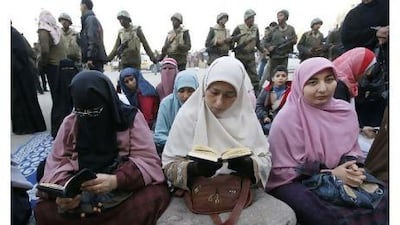CAIRO // As the new Egypt takes shape, activists are voicing concerns about who will be included in the power structure and who will be left out.
Groups traditionally lacking influence in Egyptian politics include women and the shrinking number of Christians, who make up only 10 per cent of the population.
But the disenfranchised also include Nubians, Bedouins, Berbers, the Dom and Beja peoples, and rural communities far from urban hubs of power. Coptics, Egypt's largest Christian group, as well as Bahais and other non-Muslim groups are also now seeking to have more say in how the country is run.
Last week the Egyptian Coalition for Civic Education and Women's Participation, made up of more than 100 non-governmental organisations, denounced initial amendments proposed to Egypt's constitution, saying the planned changes exclude women candidates from presidential elections.
That came after criticism, including from the US government, on the make-up of the committee that drafted the reforms. The panel did not include a woman or a Copt.
Analysts attributed the exclusion to the temporary rule of the Higher Military Council, but said it was worrying. Soha Abdelaty, deputy director of the Egyptian Initiative for Personal Rights, said: "While we understand this is an interim arrangement, the process of transition is as important as the results,"
"We want transparent and representative decisions so that all groups in all areas of Egypt feel they are part of the country," Ms Abdelaty said.
Only eight of 454 seats in parliament were held by women in 2010 before a quota was put in place for elections in November to guarantee 64 seats.
Discriminatory social attitudes towards women, Christians and other minorities have been fostered through the media, education and government pronouncements.
For women, that plays out in sexual harassment, lack of job opportunities, family pressure about choice of a marriage partner, and other economic and social concerns.
And positions in media and public office as well as access to education have often been hard for females to attain in Egypt.
Yousuf Sidhum, the editor of the weekly Coptic newspaper Al Watani, said: "School books are a good example of how discrimination is fostered. Many of the books promote ideas that Islam is the only religion and these attitudes carry through into society."
Iman Bibars, the head of the Association for the Development and Enhancement of Women, said: "Women have for too long not been fairly heard. That runs from too few women in the workplace to reduced chances of going to school for girls compared to boys."
Similarly, Copts have long complained of discrimination in the law and that the government plays a role in stoking religious tensions.
Mr Sidhum said: "The biggest grievances for the community have been Article 2 of the constitution which provides for an influence of Sharia law, and the difficult process of getting permission to build and maintain a place of worship. This is harder not just for Copts, but other minority religious groups too."
It was not until 2009 that the law was changed to allow Bahais to identify themselves as Bahais on identity documents; previously they had been obliged to choose either Muslim or Christian. Those who refused to do so were denied local services.
Youth groups, which were crucial to the success of the protests, have also voiced their concerns about having a voice, in a series of meetings with the Higher Military Council.
"One of the huge successes of the revolution has been youth getting their voice heard," Ms Abdelaty said. "We now need to organise all groups to do the same."
Of course, gaining political office will be crucial to empowerment for women and minorities. Ms Bibars said her organisation was seeking young women to train and support to run for parliament and local elections.
"There are hundreds of young women who showed during the revolution that they can represent us, but we need to make sure we don't miss out to those with money or political savvy," she said.
For Copts gaining political power may mean organising outside of churches. The Coptic church has lost clout because of its cosy relationship with the regime of former president Hosni Mubarak. This was exacerbated by the church's criticism of protests at the start of the demonstrations which ultimately toppled the president.
"There is a distinct movement to keep the church as a spiritual place but go and integrate into politics," Mr Sidhum said. "We want to form mixed parties as opposed to Coptic parties. This would truly be transforming the revolutionary spirit into action."
Activists say their actions will be key to the future of the country.
"We need to be patient to see what happens," Ms Bibars said. "But we also need to remember that no one will include us unless we push for it. We learnt that in Tahrir."

